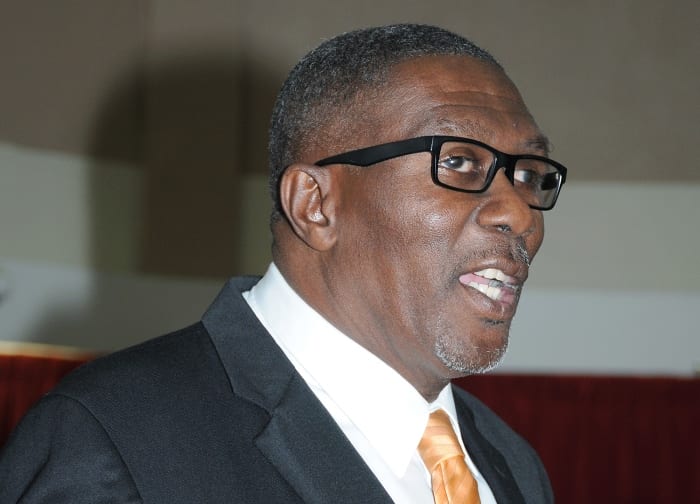
Parliamentary Secretary in the Ministry of Education, Senator Harcourt Husbands. (FP)
Government has welcomed the opportunity to benefit from the experiences of Germany in respect of its transition to renewable energy and energy efficiency.
Speaking at the opening of the German Energy Transition Travelling Exhibition at the Cave Hill Campus, UWI on Monday, Senator Harcourt Husbands, Parliamentary Secretary in the Ministry of Education, lauded Germany’s record of 85 per cent of electricity consumption from renewable energy.
Senator Husbands, who was deputising for Minister with responsibility for Energy, Senator Darcy Boyce, submitted that small island developing states (SIDS), though structurally different from Germany, must seek to replicate this success “since our very survival depends on this effort”.
He argued: “Caribbean SIDS make no substantive contribution to global warming, since our collective emissions of greenhouse gases total less than one per cent of all emissions worldwide. Despite this, SIDS suffer disproportionately from the impact of climate change, given our size, location and economic characteristics.”
He observed that the countries of the Caribbean had some of the highest electricity prices in the world, since most were net importers of petroleum products with small isolated electricity grids.
“Our efforts at sustainability are therefore driven by a need for climate resilience as much as it is by economics,” he posited.
Senator Husbands told his audience that Barbados’ aspirational goal was to achieve a 100 per cent renewable energy island within the next 50 years.
The recently launched National Energy Policy, he said, sought to increase the share of renewable energy in the energy mix by 75 per cent and to reduce the importation of fossil fuels by over 50 per cent by 2037.
He stated: “Our energy mix is to be one that will concentrate on solar and wind as the intermittent sources of energy; biomass, including waste-to-energy as baseload; natural gas as a bridging medium-term measure; and the use of bio-energy.”
He outlined some of the initiatives taken by Government so far, including the passage of the Electric Light and Power Act, which will allow independent power producers to generate and sell electricity from renewable sources to the public grid; the installation of solar photovoltaic systems on the roofs of 30 public buildings and the launch of the electric vehicles pilot project.
The German Travelling Energy Exhibition is open to public viewing until December 2, from 9:00 a.m. to 5:00 p.m. each day.
